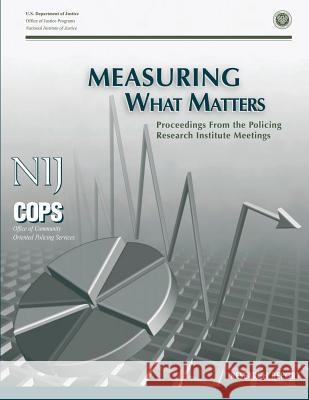Measuring What Matters: Proceedings From the Policing Research Institute Meetings » książka
Measuring What Matters: Proceedings From the Policing Research Institute Meetings
ISBN-13: 9781494226596 / Angielski / Miękka / 2013 / 236 str.
In 1992, a paper by George Kelling appeared in The City Journal titled "Measuring What Matters." In this paper, Kelling raised the perennial specter of police performance measurement, but this time with a new twist. His discussion focused on the organizational performance measurement demands of community oriented policing. In essence, Kelling's argument was that our traditional yardstick was outdated and needed to be changed. The National Institute of Justice (NIJ) and the Office of Community Oriented Policing Services (COPS) also recognized that our historic measures of police organizational performance were outmoded. To address this issue, NIJ and COPS collaborated on a first-of-its-kind Policing Research Institute that focused on "measuring what matters." The Policing Research Institute examined the implications of community policing for measuring organizational performance and helped move the industry toward a new, more relevant set of assessment criteria. To accomplish this task, police executives, researchers, scholars, and others interested in police performance measurement were invited to Washington, D.C., to address a range of measurement issues. Measuring What Matters consisted of three meetings, each focusing on a particular set of topics. Each meeting considered a set of discussion papers commissioned by NIJ and COPS and prepared by selected Institute participants. The meetings produced: Heightened awareness within the police and research communities of changing measurement needs associated with the shift to community policing; Better informed Federal research and development grant programs on measuring police performance (the NIJ Measuring What Matters research solicitation, issued in May 1997, was shaped in part by these discussions); A series of papers, designed to reach a wide audience, chronicling the Institute proceedings; This compilation of revised papers.
Zawartość książki może nie spełniać oczekiwań – reklamacje nie obejmują treści, która mogła nie być redakcyjnie ani merytorycznie opracowana.











